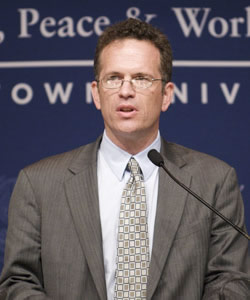What is the human person? As human beings, we are biological as well as social creatures; we inhabit both physical and cultural space. What distinguishes us as persons, and not just as organisms, is a culture of human dignity – the shared idea that, as human beings, we are entitled to respect and recognition from one another.
Where does the dignity of the human person come from? Broadly speaking, one can distinguish secular-scientific and religious foundations.
From a secular and scientific angle, we have dignity and should respect and recognize one another because of our common humanity. Some emphasize our shared capacity for independent thought; in line with Immanuel Kant, they see autonomy and rationality as a foundation for human dignity. Others focus more on our ability to identify and sympathize with others, an approach related to Jean-Jacques Rousseau’s concept of “pitié” and Adam Smith’s “moral sentiments.”
Recent advances in evolutionary biology and neuroscience have deepened our understanding of this latter, relational approach to the foundations of human dignity. In the long run, evolution appears to have favored the development of ecological sensitivity, group identification and solidarity, and cooperation in the acquisition and shared use of resources. In the here and now, new developments in neuroscience suggest that our brains are much more than autonomous information processors; they change and grow through our interactions and relationships with others and with our external environments.
Interestingly, scientific methods that do not begin with the concept of human dignity are increasingly leading to a conclusion compatible with it — that we have good evolutionary and biological reasons to acknowledge one another as fellow human beings worthy of respect and recognition and therefore endowed with an intrinsic dignity.
For Catholicism and Islam, the focus of the Contending Modernities project, the dignity of the human person has divine foundations. Because God created each of us and cares for each of us, each individual person has an intrinsic and inviolable dignity. The moral theology of the person is most developed in Christianity; it is connected with the mystery of the Trinity (one God in three persons), and in the Incarnation (God becoming a human being.) But the idea of the person, as a creature of an all powerful and merciful God, also plays an important role in Islam. God reveals his law to humankind and calls us to live as His co-regents on earth, honoring one another with recognition and respect.
There is, of course, a fundamental asymmetry between the secular-scientific and the religious understandings of the human person. The non-believer will reject the idea that the dignity of the human person has divine origins, while the believer will typically assert that human dignity has both divine and natural foundations.
Yet this asymmetry need not be a barrier to dialogue. In our contemporary era, even those who reject the idea of human dignity as fuzzy and unscientific generally affirm the importance of according basic respect and recognition to all human beings. The basic idea of the human person and of universal human dignity is shared, even as terminology differs. The 1948 Universal Declaration of Human Rights, which emerged out of decades of contestation within and across secular and religious traditions – and in revulsion against the horrors of two world wars and the Holocaust – remains the clearest and most powerful expression of this far-reaching consensus.
In practice we know that this broad contemporary convergence around the idea of the human person and human dignity, across the secular-religious divide, coexists with fierce disagreement on a range of ethical and policy questions. Is the human embryo or fetus a human person deserving of protection? Are primates or other non-human animals to be considered persons with intrinsic dignity or rights? Should governments work to secure equality of opportunity for their citizens and provide a minimum standard of living for all? Should governments and citizens share their wealth with those in need outside, as well as inside, a nation’s borders? Questions relating to the human person and human dignity can be multiplied across economic, social, cultural, and foreign policy domains (even if, in the United States, they tend to center on bioethics).
A key challenge in such ethical and policy debates, within and across secular-scientific and religious communities, is to keep the ideas of the human person and of human dignity in the foreground. That means asking what is at stake for particular people and their livelihoods in particular contexts, as well as thinking through the ethical implications of our individual and collective decisions for global humanity, at a time when the rapid advance of technology and of globalization in all its dimensions is rendering those decisions more complex and consequential.
A focus on the human person has a further implication, perhaps the most challenging of all – that in all these ethical and policy controversies, we should acknowledge the humanity and dignity of our interlocutors, no matter how much we may disagree.


One thought on “Human Persons and Human Dignity: Implications for Dialogue and Action”